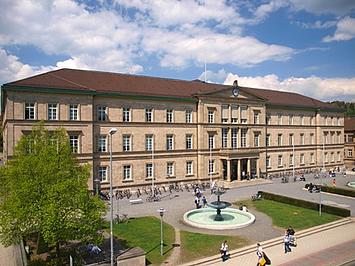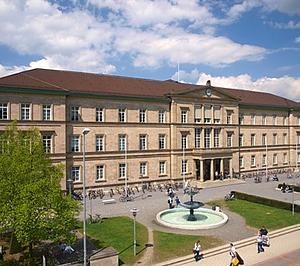You will be able to analyze financial and economic data in a scientific manner.
The 2008 crisis originating in the financial sector had severe consequences for economies and societies worldwide. It is therefore of the utmost importance that decision makers in financial institutions, regulatory offices, and central banks have a sound understanding of economic theory, the financial instruments designed for risk management, and the tools of modern econometric analysis. Consequently, the M.Sc. in Economics and Finance combines the strenghts of our school in economics, finance and econometrics to endow our graduates with the skills needed to address these issues.
Graduating from our program, you will be able to analyze financial and economic data in a scientific manner. You will know how prices of risky assets should be determined and understand why financial instruments like options and futures can increase social welfare, even though they may involve potential risks for individual investors and financial stability.
Throughout the program, you will acquire methodological skills (theoretical, econometric and programming) and expertise that greatly enhance your career perspectives. A M.Sc. in Economics and Finance is the first step towards an ambitious professional career in private and public (financial) institutions or academia.
Aside from the M.Sc. in Economics and Finance program, the School of Business and Economics offers two related programs:
- M.Sc. in Economics
- M.Sc. in International Economics
Each program starts with core courses, paving the ground for subsequent field courses. They draw on a common pool of field courses, but each program has its own curricular requirements that reflect its philosophy and orientation.
Curriculum
Our M.Sc. in Economics and Finance candidates are required to pass at least one of the two core courses in economics, finance, and econometrics, respectively (27 ECTS credits). To allow for tailored curricula accommodating personal research interests, students may then concentrate on specialized field courses, which can be flexibly bundled into modules adding up to another 27 ECTS credits. Moreover, elective courses allow students to further deepen their specialization or, alternatively, to broaden their expertise by attending complementary courses, including interdisciplinary elements. The elective studies similarly add up to 27 ECTS credits.
Many courses also contain a practical class, in which students learn to use econometric and statistical software packages (Matlab, GAUSS, SAS, Stata) to perform empirical analyses and to implement numerical methods in finance and economics. A command of these tools enables our students to write Master theses with genuine quantitative research results. The importance of the Master thesis is reflected in its weight of 30 ECTS credits, corresponding to six months fully devoted to working on the thesis.
Professional Career
We offer a Master degree that enjoys a high international reputation and gives you a competitive edge on the job market. You will acquire cutting-edge scientific knowledge that is in high demand for a broad range of professional careers. Graduates may aim for a subsequent doctoral degree (Ph.D.) or executive careers in business and finance as well as administrative positions in the public sector and international institutions. Moreover, career paths in economics and finance also include policy advising, publishing, consulting and research.
Ph.D. Track
Graduates will also find themselves well-positioned to pursue a Ph.D. subsequent to this M.Sc. program. Towards this end, students may study this M.Sc. program on a Ph.D. track, putting themselves on a fast track to a doctoral degree.
The Ph.D. track requires 27 ECTS credits from courses explicitly marked as Ph.D.-oriented. These courses take students to the frontier of academic research. Moreover, Ph.D. track students need to write a high-quality Master thesis that can serve as a starting point for their Ph.D. thesis.
Admission to the M.Sc. in Economics and Finance program requires a Bachelor’s degree in economics, business studies or a related field with excellent grades. Applicants are expected to have sound intermediate level knowledge in
- Microeconomics,
- Macroeconomics,
- Finance and
- Quantitative Methods (Mathematics / Statistics / Econometrics)
The entire program is taught in English. Applicants should therefore have an excellent command of the English language.
Knowledge of German is not required to complete the program. However, German classes are available for international students.
The program is free of tuition fees for all EU residents. The state of Baden-Württemberg has introduced fees for international non-EU students and second-degree students. For background information and for fee exemption options, please refer to this link.
Dates
Admission is subject to a competitive selection procedure that includes individual interviews with faculty members. Shortlisted candidates from overseas will be interviewed in a video conference.
Application deadline: May 15
Our programs start at the beginning of October (a preparatory math course commences in September).
Please refer to our homepage to find out when we will be holding interviews this year.
The School of Business and Economics at the University of Tübingen is committed to high-level academic education in both business administration and economics. It features a faculty of 26 professors and about 45 junior researchers, all of whom are actively engaged in academic research.
Our Bachelor and Master programs mirror the widely respected academic expertise of the faculty. Students benefit from courses taught at the frontier of academic research as well as from dedicated tutoring and learning in small groups with close contact to their academic teachers.
The School of Business and Economics offers three Bachelor of Science programs and ten Master of Science programs that allow students to specialize in areas with promising career prospects.
The Master programs at the School of Business and Economics
- Accounting and Finance (M.Sc.) >
- Economics (M.Sc.) >
- Economics and Finance (M.Sc.) >
- European Economics (M.Sc.) >
- European Management (M.Sc.) >
- General Management (M.Sc.) >
- International Business (M.Sc.) >
- International Economics (M.Sc.) >
- Management and Economics (M.Sc.) >
- Data Science in Business and Economics (M.Sc.) >





















